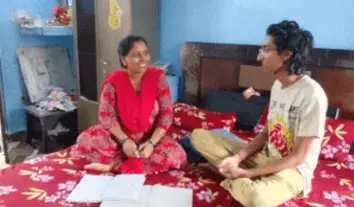
What Have I Learned?
Over the course of my time at CORD so far, I have delved into understanding the microcredit system at a grassroots level. The experience was fascinating, opening new doors for me about how poverty alleviation initiatives should be changed and furthered. Over the course of 7 weeks, I delved deeply into how Mahila Mandals manage the creation of Self-Help Groups (SHG), witnessing the formation of a new SHG at a Mahila Mandal. I gathered data in the field, working with CORD workers to collect information from the secretaries of each SHG, despite working in a language I’m inexperienced with.
I sorted through data and information, organizing and analyzing data in various ways to further understand where loans seem to be going in the 3 Panchayats that CORD has a heavy presence in. Additionally, I researched the history of SHGs and understood how they have evolved over time. Through all of these endeavors, I was able to create a several-page report analyzing and drawing broad conclusions about recent loans given by 31 SHGs. I looked at what SHGs seemed to be taking the most loans for and analyzed the different loan splits between several Panchayats. Additionally, I was able to gather data to analyze the loan growths of different SHGs.
This contributed to my learning as it opened up perspectives on how microcredit can functionally improve the lives of people. Many interns might discuss how it helped them understand the gripes of those in rural communities, but my understanding was the power of the human spirit to utilize different strategies for solving issues. Beyond just my direct experience related to my research project, I had many experiences in rural India that I feel benefited my own understanding of the world and the human condition. Many in America don’t truly understand the issues each rural community faces and instead generalize problems related to poverty. Rather, I began to understand that a multifaceted approach was required for these communities to form cohesive economic bonds that structurally benefited all community members in a way that uplifted everyone. I was glad to understand how CORD was attempting to do this through the use of the microcredit program. By allowing farmers to take loans for rural income-generation activities and then providing these farmers a path to sell their products, CORD is able to solve several issues at once: product creation and product sale. Additionally, after asking and interviewing other workers, I understood how the health aspect contributes to these community members; how can someone use a loan they took without being in proper health? All of these different experiences allowed me to gain an understanding beyond just something basic such as “CORD uplifts through development”. Rather, the internship allowed me to experience in real-time how this upliftment is actually created. Despite adjustment difficulties, considering that I lived in California my entire life, my whole experience at CORD was quite enjoyable. Interacting with workers, understanding the lives that these women lead, and seeing the Himalayan mountain range all contributed to a remarkable time. I definitely recommend this to others who have an interest in seva and want to experience really serving the global community in some meaningful way.
